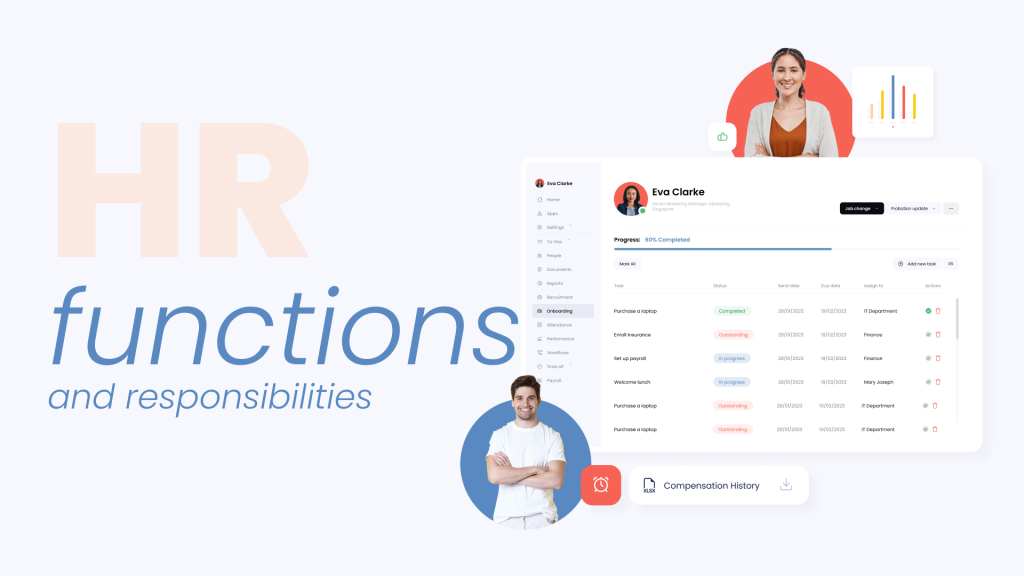No matter your location, adapting to the unique aspects of your work environment is crucial. For HR professionals, knowing the specific differences and how to manage them is absolutely essential to their roles, so they know they are providing the top employee wellness, and actively contributing to their organization’s success.
It’s no different in Singapore, where the unique culture, geographical location, and diverse workforce mean there’s a lot HR professionals need to be aware of. If you work in Human Resources in Singapore, here’s everything you need to know to make sure you’re making the most of your role:
HR Functions and Responsibilities

HR plays a vital role for employee welfare and business success in Singapore. Here are some of the core responsibilities you can expect to take on for Human Resources in Singapore:
Recruitment
Human Resources in Singapore are responsible for attracting and hiring qualified talent to meet your organization’s staffing needs. This includes writing job descriptions, sourcing candidates through available channels (like recruitment websites, job fairs, etc.), conducting interviews, and facilitating the hiring process.
The mandate of recruiters has expanded over the years, as remote work has made for a larger (and increasingly competitive) talent pool. Finding new ways to connect with remote talent, especially given Singapore’s global business appeal, will be an important part of your job function.
Relevant readings: Is Your Business Prepared to Work With Gen Z and Gen Alpha?
Onboarding
Another important function and responsibility of Human Resources in Singapore is onboarding, which is essential for welcoming new employees into your organization and setting them up for success. Your HR team will need to oversee the onboarding process, which starts with orientation, onboarding documents completion, introduction to company culture and policies, and initial training.
Even great talent can stutter if onboarding isn’t made a top priority for you and your team. Put extra emphasis on demonstrating an inclusive company culture, which will help the diverse pool of talent available in Singapore onboard more smoothly.
Performance Management
Your HR department is tasked with implementing performance management processes to monitor and evaluate employee performance. Examples of this are setting performance goals and expectations, conducting regular performance reviews, providing feedback and coaching, and recognizing and rewarding high performers.
Effective performance management is perhaps the HR function with the most moving parts, and has some of the most data to track and act on. Leveraging technology to help your Human Resources in Singapore is a great idea.
Additional resource: Download our Total Performance Review Kit to enhance your performance review process!
Compensation and Benefits
Your HR team manages compensation and benefits programs to ensure competitive pay and attractive benefits packages that align with industry standards and meet the needs of employees. This includes salary benchmarking, administering payroll, managing employee benefits such as health insurance and retirement plans, and addressing compensation-related questions.
Read next: The Cost of Recruitment: HR’s Guide to Creating, Tracking and Implementing a Salary Budget
Training and Development
Human Resources in Singapore oversees training and development initiatives to enhance employee skills and capabilities.You’ll want to consider training needs, designing and delivering training programs, facilitating skills development workshops, and promoting continuous learning opportunities for employees.
Educating and training your talent pool isn’t only a great idea because it makes for a more skilled workforce—employees who feel they’re invested in are more likely to have higher employee engagement and productivity.
Employee Retention
Retaining top talent is a major priority for Human Resources in Singapore. You’ll need to implement strategies to enhance employee engagement, job satisfaction, and reduce attrition rates. This involves conducting employee satisfaction surveys, implementing employee recognition programs, and addressing workplace issues or concerns promptly.
Employee retention is definitely not a one-size-fits-all issue—taking a variety of approaches, including considering extrinsic value such as increases in competition to keep up with inflation is necessary to retain your best talent.
Read next: 12 Employee Recognition Examples to Keep Your Team Engaged All Year
Compliance
Staying compliant with labor laws and regulations is a critical responsibility for Human Resources in Singapore. You’ll have to stay updated on employment laws, regulations, and industry standards to ensure that organizational policies and practices are in compliance with legal requirements. This includes managing employment contracts, leave entitlements, working hours, and workplace safety regulations.
Laws Governing HR in Singapore
Human Resources in Singapore is governed by a number of laws and regulations aimed at protecting the rights of employees and ensuring fair treatment in the workplace. Having a keen understanding of these laws and the documents that contain them is necessary for HR professionals working in Singapore. Here are some of the key laws you need to be aware of:
Employment Act
The Employment Act is the main labor law for Human Resources in Singapore, providing basic employment rights and protections for employees covered under the Act. It deals with key areas such as employment contracts, working hours, overtime pay, annual leave, public holidays, and termination of employment.
Central Provident Fund (CPF)
The Central Provident Fund is a mandatory social security savings scheme for Singapore citizens and permanent residents. Both employers and employees are required to make monthly contributions to the CPF, which is used to fund retirement, healthcare, and housing needs.
Foreign Manpower Act
The Foreign Manpower Act regulates the employment of foreign workers in Singapore. It sets out the requirements and laws for employers hiring foreign employees, including the necessary valid work permits and passes and comply with foreign worker levy requirements.
Personal Data Protection Act (PDPA)
The PDPA governs the collection, use, and disclosure of personal data in Singapore. Human Resources in Singapore must ensure compliance with the PDPA when handling employee personal information, including obtaining consent for data collection and implementing measures to protect personal data from unauthorized access or disclosure.
Work Injury Compensation Act (WICA)
The WICA provides compensation for employees who suffer from work-related injuries or occupational illnesses. It requires employers to provide compensation for medical expenses, lost wages, and other benefits to employees injured during their employment, regardless of who’s at fault.
It’s important that you and your team stay up to date on all of the above regulations and laws. Like elsewhere, labor laws in Singapore are prone to change and updates, and staying on top of them will ensure you stay compliant and avoid any penalties.
Common HR Challenges in Singapore
HR professionals everywhere must face a variety of challenges inherent to their role. But when it comes to Human Resources in Singapore, there are also several unique obstacles you’ll need to be aware of so you can strategize effectively on how to overcome them. These include:
Aging population
Singapore’s population is aging rapidly, leading to a shrinking workforce and an increased demand for healthcare and eldercare services. Human Resources in Singapore must address the needs of an aging workforce, including succession planning, knowledge transfer, and implementing policies to support older employees.
And as more and more members of your workforce reach retirement age, you’ll need to consider how to replace them. In the long term, a robust recruitment strategy will be required, but in the meantime consider how to implement technology that reduces manual workload, increases automation and boosts efficiency to compensate for a contracting workforce.
Rising labor costs
Singapore has one of the highest labor costs in Asia, driven by factors such as tight labor market conditions and increasing wages. You and your HR team will need to manage labor costs effectively while ensuring fair compensation and benefits for employees to remain competitive in the market.
You’ll also have to consider inflation—it remains high globally but particularly so in Singapore. This effectively eats into your employees’ real wage value, and needs to factor into your understanding of their compensation.
Skills gap
The rapid pace of technological advancements and industry transformations has created a skills gap in Singapore, with employers struggling to find candidates with the right expertise. Human Resources in Singapore can play a crucial role in identifying skill gaps, implementing training and development programs, and upskilling existing employees to meet evolving business needs.
Attracting and retaining talent
With a highly competitive labor market, attracting and retaining top talent is a significant challenge for organizations in Singapore. Your HR department will need to develop effective employer branding strategies, offer competitive compensation packages, and create a positive work culture to attract and retain skilled employees.
Managing remote and hybrid work arrangements
The pandemic has accelerated the adoption of remote and hybrid work models in Singapore. More frequently than ever, employees are going to expect some sort of remote component to their work, and for many of them this is a significant benefit.
To remain competitive, you’ll need to consider policies and practices to support remote work, ensure employee productivity and engagement, and address challenges related to communication, collaboration, and work-life balance in a virtual environment.
Ways to Stay Ahead of Human Resources in Singapore

Staying ahead in Human Resources in Singapore requires you to be proactive, innovative, and adaptable. You need to be able to stay on top of the changing needs of your workforce and the evolving laws and regulations that protect them. Here are some strategies to stay ahead in HR:
Implementation of HR Technology
Consider HR technology solutions such as Human Resource Information Systems (HRIS), Applicant Tracking Systems (ATS), and Performance Management Software to streamline HR processes, improve efficiency, and enhance employee experience.
This tech also helps Human Resources in Singapore automate manual processes that are not only time consuming but prone to human error. With the right HR solution, you’ll not only be able to save time and do work more efficiently, you’ll be able to do so with the confidence you’re remaining compliant with local regulations.
Data-driven decision making
HR technology allows you to use data analytics and metrics to make informed decisions, identify areas for improvement, and measure the effectiveness of your HR initiatives.
You can analyze employee data to understand workforce demographics, performance trends, and engagement levels, helping your team to develop targeted strategies to address challenges within your organization.
Create positive employee experiences
With HR technology, you can prioritize employee experience by using it to enhance your positive work environment by promoting work-life balance, and providing opportunities for career development and growth.
It will also allow you to implement employee engagement initiatives, recognition programs, and wellness initiatives, while allowing your workforce to self-serve and access their info easily and at their discretion.
Read next: Leveraging Singapore’s Mental Well-Being Programs to Improve Employee Mental Health
Embrace diversity and inclusion
You’ll also be able to foster a culture of diversity and inclusion by promoting equal opportunities, celebrating diversity, and creating a supportive and inclusive workplace environment. This can be done by establishing DEI policies, starting diversity and inclusion training programs and unconscious bias training, available to employees through their HR platform. This will help to address systemic barriers and promote diversity at all levels of your organization.
Adapt to changing laws and regulations
Stay up to date with any changes in employment laws, regulations, and industry standards in Singapore. With the right technology, you can proactively update your HR policies and practices to ensure compliance with Singapore legal requirements and maintain ethical and fair employment practices.
When in doubt, seek professional advice and engage with industry associations to stay informed about regulatory changes and best practices in Human Resources in Singapore.
Building a Competitive Edge with HRIS
Human Resources in Singapore play a critical role in driving organizational success through effective talent management, compliance with labor laws, and fostering a positive workplace culture.
Omni frees HR teams from administrative cycles by automating the entire end-to-end employee lifecycle — from recruitment and onboarding to employee engagement and payroll — allowing you to redirect your time to strategic work that drives business growth.
Powering Asia’s fastest-growing, modern companies, Omni scales alongside your company so you can customize and leverage the system to meet your business exactly where you are — as well as where you’re going.
With a full suite of modules to support every aspect of your business, Omni’s platform offers an intuitive and fully customizable platform that integrates with your team’s favorite tools for a seamless and timely adoption.
Start your 14-day free trial and learn how Omni can help you build a competitive edge for Human Resources In Singapore.


